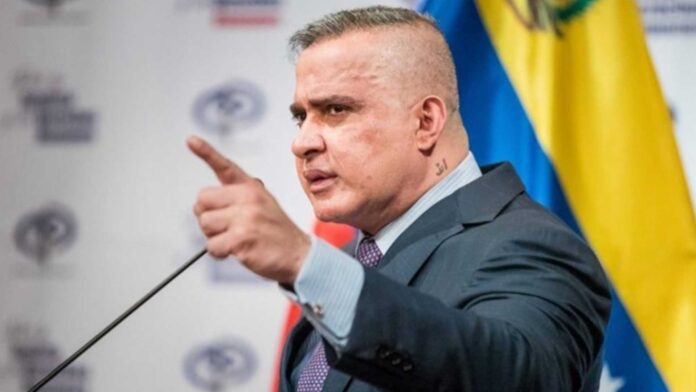Internal purges within Chavismo escalate amid conflict with the U.S.
Corruption, unethical behaviors, and suspicions of purges within Chavismo have opened a new chapter in the ongoing crisis of the judicial system in Venezuela.
The Attorney General, Tarek William Saab, reported the arrest of 14 prosecutors and judges, as mentioned in the announcement, making a total of 592 former officials from the Public Ministry prosecuted for corruption since he took office.
Tarek William Saab was appointed by the now-defunct Constituent National Assembly in 2017. However, the recent arrests include high-ranking prosecutors close to Saab.
This and other details have led some analysts to wonder whether this is a Chavista purge against the Attorney General as the conflict with the U.S. escalates and distrust rises among senior officials within Nicolás Maduro’s administration.
“Settling Scores or Internal Revenge”
Lawyer Carlos Lusverti, a consultant for the International Commission of Jurists, told DW that these arrests “are related to settling scores or internal revenge, meaning these networks of corruption that are now being exposed may have touched the interests of other sectors.”
In his view, this is a reorganization tied to a more restricted international context, where “these informal groups have more limited operational spheres.”
Indeed, the 14 detained prosecutors are from Carabobo state, including the chief prosecutor for that region. A few days ago, during the corruption investigation of the Public Ministry, the lifeless body of former assistant chief prosecutor of Carabobo, Luis Enrique Maldonado Vásquez, was found.
His death, presumed to be a suicide, occurred after Saab had named him on social media as a suspect in the extortion case being investigated.
Close to the Attorney General
As part of the investigation into extortion plots within the Public Ministry, the state’s intelligence agency (SEBIN) has conducted a series of interrogations with key individuals.
Among these individuals is prosecutor Farik Mora Salcedo, who handles political prisoner cases and has been accused by the opposition of participating in torture during interrogations.
SEBIN also interrogated three directors from the Public Ministry: Marvin Emperatriz González Barrios, director against corruption; Ángel Fuenmayor, director of common crimes; and Orlando Peña, director of organized crime.
While the names of the detained individuals are not known, those mentioned are missing and were all appointed by Tarek William Saab, responding directly to him.
Laura Louza, director of the Venezuelan NGO Access to Justice, which monitors the justice administration in Venezuela, told DW that the most astonishing thing about these arrests is that “many of them were actually in charge of controlling corruption within the Public Ministry. So if the judges and prosecutors who are supposed to ensure justice in that area are corrupt, then how can there be justice?”
Impunity in Venezuela
For years, impunity has been a structural problem within the judiciary in Venezuela, as reported by various international organizations, including the U.N.’s International Fact-Finding Mission and the Office of the High Commissioner for Human Rights. Moreover, the World Justice Project ranked Venezuela 142nd, the lowest position on its Global Rule of Law Index.
According to Lusverti, “impunity is a structural problem that goes beyond Saab’s particular situation,” and “due process has become an illusory guarantee over the past few years” in the country.
Access to Justice concurs, stating that these purges within the judicial system “confirm what citizens feel, that the administration of justice in Venezuela is corrupt and ultimately benefits those in power, even leaving those part of the power structure unpunished,” emphasizes Louza.
Purge Intensifies Amid Conflict with the U.S.
This new scandal within the Venezuelan judicial system emerges amidst a conflict with the U.S., which has resulted in at least 14 deaths and two ships sunk in the Caribbean, allegedly belonging to drug traffickers from Venezuela.
The Trump administration has been vocal about deploying military resources in the Caribbean to combat drug trafficking from Venezuela, directly blaming Nicolás Maduro as the leader of the Cartel of the Suns.
A bounty of $50 million for Maduro’s capture has heightened levels of distrust among top officials in Venezuela’s authoritarian regime.
U.S. External Pressure
Investigative journalist specializing in organized crime, Ronna Rísquez, states that these arrests represent a “partial purge affecting the Attorney General,” as she mentioned to DW. R Ísquez questions whether the trigger was the corruption schemes. “All this must be understood in the context of the political or warfare situation with the U.S.,” she highlights.
For lawyer Lusverti, this scenario remains confusing because although different factions exist within power in Venezuela, external pressure “ultimately causes the various factions to align more under the logic of trying to prevail in the government.”
However, Lusverti does not rule out that one of the different factions “could be generating all these internal persecutions, as it is what external factors bet on for a breakup of power from within.”
Within the context of external pressure from the U.S. towards Nicolás Maduro’s regime, a purge is not the strangest thing that could happen within Chavismo. “The fear of betrayals and snitches” are motivations that Ronna Rísquez considers in this new saga, but she warns that “it doesn’t necessarily mean that the structure of the judicial system will change; what’s changing are the names and perhaps the loyalties.”
Oscar Shlenker/ DW
